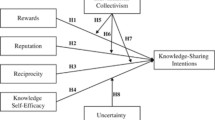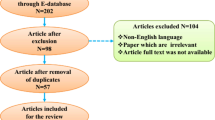Abstract
Knowledge sharing is the behavior of disseminating acquired knowledge to other members of an organization, and often presents major challenges, because some employees resist sharing their knowledge with others. In this paper, we investigate the knowledge sharing behavioral intention based on social exchange theory (SET). SET emphasizes non-material exchange, and people share their knowledge by weighing the potential benefits and risks of social relationships. The research presented in this study includes various constructs based on SET and social cognitive theory. This study examines the role of social exchange factors (perceived organizational support, organizational trust and reciprocal relationship expectancy) in explaining IT professionals’ knowledge sharing intentions through KMS. Based on a survey of 251 IT professionals in STSP, this study applies structural equation modeling to verify the research model. The results showed that trust, self-efficacy and reciprocal relationship expectancy are significantly associated with knowledge sharing through KMS.
Similar content being viewed by others
References
Abrams L.C., Cross R., Lesser E., Levin D.Z.: Nurturing interpersonal trust in knowledge-sharing networks. Acad. Manag. Executive 17(4), 64–77 (2003)
Ajzen I., Fishbein M.: Belief, Attitude, Intention, and Behavior: An Introduction to Theory and Research. Addison-Wesley, Reading (1975)
Alavi M., Leidner D.E.: Review: knowledge management and knowledge management systems: conceptual foundations and research issues. MIS Q. 25(1), 107–136 (2001)
Aryee S., Budhwar P.S., Chen Z.X.: Trust as a mediator of the relationship between organizational justice and work outcomes: test of a social exchange model. J. Organ. Behav. 23(3), 267–285 (2002)
Asgari A., Silong A.D., Ahmad A., Samah B.A.: The relationship between transformational leadership behaviors, organizational justice, leader-member exchange, perceived organizational support, trust in management and organizational citizenship behaviors. Eur. J. Sci. Res. 23(2), 227–242 (2008)
Assimakopoulos D., Yan J.: Sources of knowledge acquisition for Chinese software engineers. R&D Manag. 36(1), 97–106 (2006)
Bandura A.: Self-Efficacy: The Exercise of Control. Worth Publishers, New York (1997)
Bell S.J., Menguc B., Stefani S.L.: When customers disappoint: a model of relational internal marketing and customer complaints. J. Acad. Mark. Sci. 32(2), 112–126 (2004)
Bock G.W., Kim Y.G.: Breaking the myths of rewards: an exploratory study of attitudes about knowledge sharing. Inf. Resour. Manag. J. 15(2), 14–21 (2002)
Bock G.W., Zmud R.W., Kim Y.G., Lee J.N.: Behavioral intention formation in knowledge sharing: examining the roles of extrinsic motivators, social-psychological forces, and organizational climate. MIS Q. 29(1), 87–111 (2005)
Browne M., Cudeck R.: Alternative ways of assessing model fit. Sociol. Methods Res. 21(2), 230–258 (1992)
Cabrera A., Cabrera E.F.: Knowledge-sharing dilemmas. Organ. Stud. 23(5), 687–710 (2002)
Cabrera E.F., Cabrera A.: Fostering knowledge sharing through people management practices. Int. J. Hum. Resource Manag. 16(5), 720–735 (2005)
Chiu C.M., Hsu M.H., Wang E.T.G.: Understanding knowledge sharing in virtual communities: an integration of social capital and social cognitive theories. Decision Support Syst. 42(3), 1872–1888 (2006)
Compeau D., Higgins C.A.: Computer self-efficacy: development of a measure and initial test. MIS Q. 19(2), 189–211 (1995)
Compeau D., Higgins C.A., Huff S.: Social cognitive theory and individual reactions to computing technology: a longitudinal study. MIS Q. 23(2), 145–158 (1999)
Constant D., Kiesler S., Sproull L.: What is mine is ours, or is it. Inf. Syst. Res. 5(4), 400–422 (1994)
Cropanzano R., Mitchell M.S.: Social exchange theory: an interdisciplinary review. J. Manag. 31(6), 874–900 (2005)
Dalkir K.: Knowledge Management in Theory and Practice. Butterworth Heinemann, Burlington (2005)
Eisenberger R., Stinglhamber F., Vandenberghe C., Sucharski I., Rhoades L.: Perceived supervisor support: contributions to perceived organizational support and employee retention. J. Appl. Psychol. 87(3), 565–573 (2002)
Etezadi-Amoli J., Farhoomand A.F.: A structural model of end user computing satisfaction and user performance. Inf. Manag. 30(2), 65–73 (1996)
Gefen D., Karahanna E., Straub D.W.: Trust and TAM in online shopping: an integrated model. MIS Q. 27(1), 51–90 (2003)
Hair J.F., Black W.C., Babin B.J., Anderson R.E.: Multivariate Data Analysis. Prentice Hall, Upper Saddle River (2006)
Hayduk L.A.: Structural equation modeling with LISREL: essentials and advances. Appl. Psychol. Meas. 13(1), 107–112 (1989)
Hekman D., Bigley G., Steensma H., Hereford J.: Combined effects of organizational and professional identification on the reciprocity dynamic for professional employees. Acad. Manag. J. 52(3), 506–526 (2009)
Hsu M.H., Ju T.L., Yen C.H., Chang C.M.: Knowledge sharing behavior in virtual communities: the relationship between trust, self-efficacy, and outcome expectations. Int. J. Hum. Comput. Stud. 65(2), 153–169 (2007)
Kankanhalli A., Tan B.C.Y., Wei K.K.: Contributing knowledge to electronic repositories: an empirical investigation. MIS Q. 29(1), 113–143 (2005)
King W.R., Marks P.V.: Motivating knowledge sharing through a knowledge management system. Omega 36(1), 131–146 (2008)
Levin D.Z., Cross R.: The strength of weak ties you can trust: the mediating role of trust in effective knowledge transfer. Manag. Sci. 5(11), 1477–1490 (2004)
Lin H.F.: Effects of extrinsic and intrinsic motivation on employee knowledge sharing intentions. J. Inf. Sci. 33(2), 135–149 (2007)
Lin T.C., Huang C.C.: Understanding knowledge management system usage antecedents: an integration of social cognitive theory and task technology fit. Inf. Manag. 45(6), 410–417 (2008)
Lynch P.D., Eisenberger R., Armeli S.: Perceived organizational support: inferior versus superior performance by wary employees. J. Appl. Psychol. 84(4), 467–483 (1999)
Mooradian T., Renzl B., Matzler K.: Who trusts? personality, trust and knowledge sharing. Manag. Learn. 37(4), 523–540 (2006)
Moorman R.H., Blakely G.L., Niehoff B.P.: Does perceived organizational support mediate the relationship between procedural justice and organizational citizenship behavior?. Acad. Manag. J. 41(3), 351–357 (1998)
Nonaka I.A., Takeuchi H.A.: The Knowledge-Creating Company: How Japanese Companies Create the Dynamics of Innovation. Oxford university, Oxford (1995)
Podsakoff P.M., Organ D.W.: Self-reports in organizational research: problems and prospects. J. Manag. 12(4), 531–544 (1986)
Randall M., Cropanzano R., Bormann C., Birjulin A.: Organizational politics and organizational support as predictors of work attitudes, job performance, and organizational citizenship behavior. J. Organ. Behav. 20(2), 159–174 (1999)
Settoon R.P., Bennett N., Liden R.C.: Social exchange in organizations: perceived organizational support, leader-member exchange, and employee reciprocity. J. Appl. Psychol. 81(3), 219–227 (1996)
Stone R.W., Bailey J.J.: Team conflict self-efficacy and outcome expectancy of business students. J. Educ. Bus. 82(5), 258–266 (2007)
Stone R.W., Henry J.W.: The roles of computer self-efficacy and outcome expectancy in Influencing the computer end-user’s organizational commitment. J. End User Comput. 15(1), 38–53 (2003)
Straub D.W.: Validating instruments in MIS research. MIS Q. 13(2), 147–169 (1989)
Ullman J., Bentler P.: Structural Equation Modeling. Handbook of Data Analysis. Sage, Thousand Oaks (2004)
Wasko M.M., Faraj S.: Why should I share? Examining social capital and knowledge contribution in electronic networks of practice. MIS Q. 29(1), 35–57 (2005)
Widen-Wulff G., Ginman M.: Explaining knowledge sharing in organizations through the dimensions of social capital. J. Inf. Sci. 30(5), 448–458 (2004)
Wu I.L., Chen J.L.: An extension of trust and TAM model with TPB in the initial adoption of on-line tax: an empirical study. Int. J. Hum. Comput. Stud. 62(6), 784–808 (2005)
Author information
Authors and Affiliations
Corresponding author
Rights and permissions
About this article
Cite this article
Tsai, MT., Chang, HC., Cheng, NC. et al. Understanding IT professionals’ knowledge sharing intention through KMS: a social exchange perspective. Qual Quant 47, 2739–2753 (2013). https://doi.org/10.1007/s11135-012-9685-4
Published:
Issue Date:
DOI: https://doi.org/10.1007/s11135-012-9685-4




